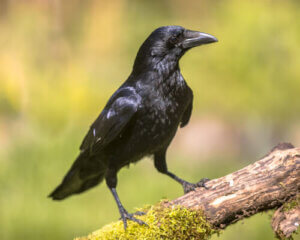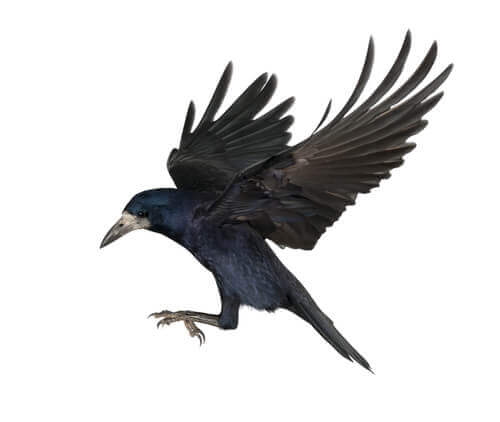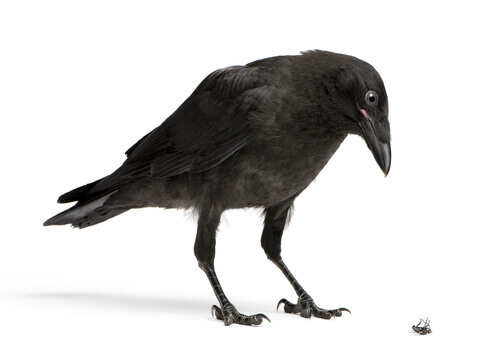The Intelligence of Crows

Belonging to the order Passeriformes, this great black bird has gained many different characterizations over time. Scientists are currently undertaking more and more studies in order to verify its capacity for reasoning. Today we’ll speak to you about the intelligence of crows.
Meet these intelligent birds
Protagonists of horror stories, inseparable companions of witches, and synonymous with both bad and good luck, these birds are the object of more and more research that proves what the observant human being always knew: they’re extremely intelligent.
The largest of the passerines (measuring between 54 and 67 cm (21 to 26 in)), it’s an animal that knows how to adapt to circumstances. Besides, everything seems to indicate that it understands many things without the need for trial and error experiences.
And, for what it lacks in knowledge, it always finds a way –even unexpectedly– to solve it. It’s even able to outwit the devices that scientists create in order to check how clever it is.
Birds with high neuronal density
As if this wasn’t enough, these birds are a contradiction with respect to the theory that the size of the brain is directly proportional to intelligence. Even if their brain mass is the largest of its order, their reasoning ability is considered superior to that of primates or of eight-year-old children.
In reality, at least in the case of these winged beings, size isn’t the main thing. It’s the neuronal density that’s important.
In the book Crows: Encounters with the Wise Guys of the Avian World, published in 2005, the writer Candace Savage suggested that these animals share certain characteristics with humans that speak of their intelligence. Among them, the use of tools and their sophisticated social behavior.

Crows’ brains have a great neuronal density.
Facts about the intelligence of the crows
Distributed throughout the Northern Hemisphere, these birds use their legs and their long, thick, robust beaks to carry out what their brains decide.
They create and use tools on a regular basis and in complex sequences, something that used to be attributed only to people. For example, they’re capable of transforming a straight piece into a hook to extract food from certain containers.
In an investigation published in the “Nature” magazine, the zoologist Alex Kacelnik pointed out that the crows of New Caledonia (Oceania) are born with this knowledge. This means that they have a genetic component that explains how they behave.
According to Kacelnik, these birds possess high-level logical thinking, forward planning and creativity that, as a rule, is only common in humans.
Crows: winged manipulators
In social interactions, the intelligence of crows is manifested in the ability to handle things. Moreover, in a study carried out by biologist Bernd Heinrichel (University of Vermont), it was established that adult and young crows use different strategies to feed on carrion.
Younger animals squawk to recruit their congeners, and thus seek to avoid competition with other scavengers. Adults, on the other hand, remain silent to avoid drawing attention to themselves.
Records show that crows make other animals work for them. It’s common for them to call wolves and coyotes to the place where there’s carrion, because, after the carnivores have opened up the carcasses, they have easier access to the food.
In addition, they observe where other crows hide their food and, thanks to their excellent memory, they get back to steal it. And, in some cases, crows leave nuts on the roads for cars to break their shells.

More details regarding the intelligence of crows
Another interesting fact is this birds’ capacity for play. It’s common to see young specimens sliding on snow, apparently simply to have fun. They also play with other species of animals.
It’s no news that they have the habit of “stealing” shiny objects. However, they usually lose their curiosity for new things when they become adults.
At this point, it’d be wrong to say that the only thing left is for these intelligent animals to talk. Some of them do, even if only to imitate a few human sounds. But, given their intelligence, everything seems to indicate that there’s still plenty to discover about them. We’ll keep you informed.
Belonging to the order Passeriformes, this great black bird has gained many different characterizations over time. Scientists are currently undertaking more and more studies in order to verify its capacity for reasoning. Today we’ll speak to you about the intelligence of crows.
Meet these intelligent birds
Protagonists of horror stories, inseparable companions of witches, and synonymous with both bad and good luck, these birds are the object of more and more research that proves what the observant human being always knew: they’re extremely intelligent.
The largest of the passerines (measuring between 54 and 67 cm (21 to 26 in)), it’s an animal that knows how to adapt to circumstances. Besides, everything seems to indicate that it understands many things without the need for trial and error experiences.
And, for what it lacks in knowledge, it always finds a way –even unexpectedly– to solve it. It’s even able to outwit the devices that scientists create in order to check how clever it is.
Birds with high neuronal density
As if this wasn’t enough, these birds are a contradiction with respect to the theory that the size of the brain is directly proportional to intelligence. Even if their brain mass is the largest of its order, their reasoning ability is considered superior to that of primates or of eight-year-old children.
In reality, at least in the case of these winged beings, size isn’t the main thing. It’s the neuronal density that’s important.
In the book Crows: Encounters with the Wise Guys of the Avian World, published in 2005, the writer Candace Savage suggested that these animals share certain characteristics with humans that speak of their intelligence. Among them, the use of tools and their sophisticated social behavior.

Crows’ brains have a great neuronal density.
Facts about the intelligence of the crows
Distributed throughout the Northern Hemisphere, these birds use their legs and their long, thick, robust beaks to carry out what their brains decide.
They create and use tools on a regular basis and in complex sequences, something that used to be attributed only to people. For example, they’re capable of transforming a straight piece into a hook to extract food from certain containers.
In an investigation published in the “Nature” magazine, the zoologist Alex Kacelnik pointed out that the crows of New Caledonia (Oceania) are born with this knowledge. This means that they have a genetic component that explains how they behave.
According to Kacelnik, these birds possess high-level logical thinking, forward planning and creativity that, as a rule, is only common in humans.
Crows: winged manipulators
In social interactions, the intelligence of crows is manifested in the ability to handle things. Moreover, in a study carried out by biologist Bernd Heinrichel (University of Vermont), it was established that adult and young crows use different strategies to feed on carrion.
Younger animals squawk to recruit their congeners, and thus seek to avoid competition with other scavengers. Adults, on the other hand, remain silent to avoid drawing attention to themselves.
Records show that crows make other animals work for them. It’s common for them to call wolves and coyotes to the place where there’s carrion, because, after the carnivores have opened up the carcasses, they have easier access to the food.
In addition, they observe where other crows hide their food and, thanks to their excellent memory, they get back to steal it. And, in some cases, crows leave nuts on the roads for cars to break their shells.

More details regarding the intelligence of crows
Another interesting fact is this birds’ capacity for play. It’s common to see young specimens sliding on snow, apparently simply to have fun. They also play with other species of animals.
It’s no news that they have the habit of “stealing” shiny objects. However, they usually lose their curiosity for new things when they become adults.
At this point, it’d be wrong to say that the only thing left is for these intelligent animals to talk. Some of them do, even if only to imitate a few human sounds. But, given their intelligence, everything seems to indicate that there’s still plenty to discover about them. We’ll keep you informed.
This text is provided for informational purposes only and does not replace consultation with a professional. If in doubt, consult your specialist.








